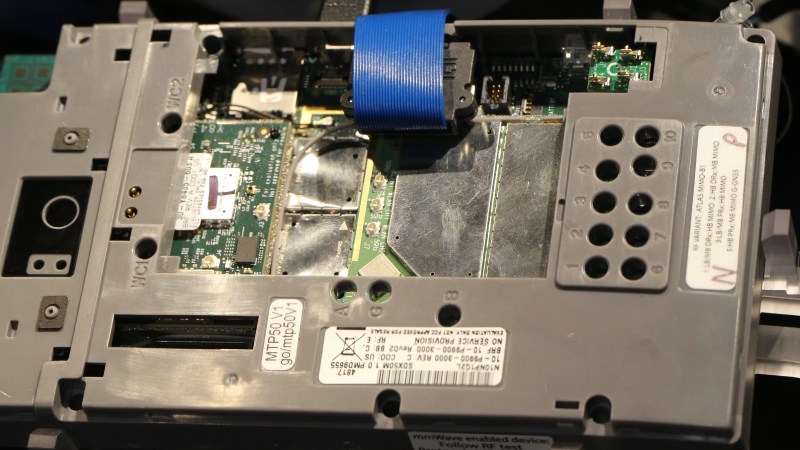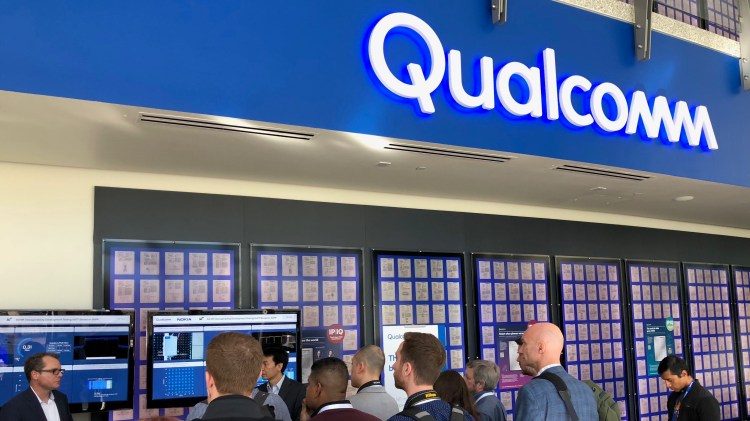Next-generation 5G cellular devices are even closer to becoming a reality today as Qualcomm announced partnerships with 19 mobile device makers and 18 carriers to bring Snapdragon X50 family 5G modems to devices sold across the world, starting in 2019. Backed by a series of 5G demonstrations at Qualcomm’s headquarters yesterday, the manufacturer and carrier announcements confirm that a wide variety of 5G phones will be available to choose from next year.
Originally announced in October 2016, Snapdragon X50 family modems promise to deliver up to 5-Gigabit-per-second data speeds and 1-2 millisecond latency, each a radical speed improvement over current best-of-class 4G LTE modems. X50 modems will expand cellular service into new sub-6 GHz and millimeter wave (mmWave) spectrum bands, as well as supporting simultaneous 4G and 5G connections for guaranteed reliability as fully 5G networks are built.

Above: Qualcomm’s Snapdragon X50 5G is the first 5G modem for consumer mobile devices, shown here in oversized prototype form
Qualcomm’s list of mobile device makers includes many of the best-known names in the consumer electronics industry, covering millions of users across the Americas, Europe, and Asia-Pacific regions. Collectively, the manufacturers announced that X50 family modems will be used in 5G phones, always-connected PCs, wireless virtual reality headsets, wireless broadband modems, tablets, and IoT devices. The names include:
- Asus
- Fujitsu and Fujitsu Connected Technologies
- HMD Global (Nokia Phones)
- HTC
- Inseego/Novatel Wireless
- LG
- NetComm Wireless
- Netgear
- Oppo
- Sharp
- Sierra Wireless
- Sony Mobile
- Telit
- Vivo
- Wingtech
- WNC
- Xiaomi and
- ZTE
Additionally, Qualcomm’s 18 carrier partners include top names from the United States, Europe, Southeast Asia, and Australia. These carriers have committed to 5G trials based on the 3GPP Release 15 5G NR standard, “utilizing Qualcomm Technologies’ 5G mobile test platform and smartphone reference design … while maintaining interoperability and coexistence with 4G LTE.”
June 5th: The AI Audit in NYC
Join us next week in NYC to engage with top executive leaders, delving into strategies for auditing AI models to ensure fairness, optimal performance, and ethical compliance across diverse organizations. Secure your attendance for this exclusive invite-only event.
- AT&T
- British Telecom
- China Telecom
- China Mobile
- China Unicom
- Deutsche Telekom
- KDDI
- KT Corporation
- LG Uplus
- NTT Docomo
- Orange
- Singtel
- SK Telecom
- Sprint
- Telstra
- TIM
- Verizon and
- Vodafone Group
Qualcomm plans Snapdragon X50 demonstrations at the upcoming Mobile World Congress in Barcelona to showcase 5G’s multiple Gbps downloads, new applications, enhanced user experiences, and 5G interoperability. Live sub-6 GHz and mmWave 5G trials with leading carriers are expected in 2018 and early 2019, followed by 2019 launches of 5G networks and devices. Notably, while many of the carriers above have explicitly committed to initial rollouts of 5G in 2019, Japanese carrier NTT Docomo has said that it will launch 5G in 2020, and some others have remained ambiguous about their launch dates.
“2018 will be a big year for Qualcomm Technologies and the mobile industry overall as we work to execute on the agreed upon 5G NR specification,” said Qualcomm president Cristiano Amon. “These trials demonstrate how we are working with global operators to fuel growth and innovation in the mobile industry and make 5G a reality by supporting a large number of expected commercial launches in 2019.”
Qualcomm’s latest announcements come one day after it publicized a successful collaboration with Nokia to test Qualcomm’s prototype 5G devices with Nokia’s AirScale base station using 3.5Ghz and 28Ghz radio spectrums. These tests will set the stage for upcoming field trials by several of the carriers mentioned above, as well as Elisa, Optus, and Telia.
Qualcomm paid for travel to report on its 5G initiatives. Our coverage remains objective.

